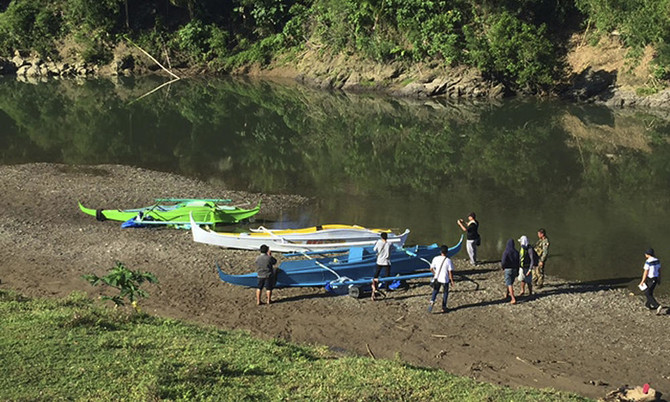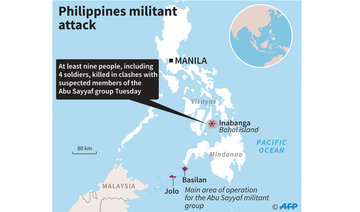MANILA, Philippines: A foiled attack on a central Philippine resort island this week was a kidnapping and bombing mission by at least three extremist groups affiliated with the Daesh group in one of their most daring terror plots, security officials said Saturday.
The Philippine military initially said that government forces, backed by airstrikes, successfully detected and thwarted a kidnapping plot by Abu Sayyaf militants in the island province of Bohol, a popular tourist destination far from the militants’ southern jungle bases.
Three soldiers, a policeman, two villagers and at least four militants, including key Abu Sayyaf commander and spokesman Moammar Askali, were killed in the daylong siege Tuesday in a hinterland village in Bohol’s Inabanga town.
Military spokesman Brig. Gen. Restituto Padilla said combined military and police forces thwarted in Bohol “major terrorist activities” by the militants, who were aiming to divert the military’s focus from intense offensives on the militants’ jungle encampments in southern Sulu province and outlying islands.
“The persons who died in the area, some of whom have been identified to be known terrorists, are still the subject of a continuing investigation to ascertain their participation,” Padilla said, adding that the result of the investigation would be made public in the near future.
Interviews with three security officials, along with documents and pictures seen by The Associated Press, indicated that three extremist groups that have pledged allegiance to Daesh deployed their leading bombers and fighters, some of whom wore Daesh-style black flag patches, for the Bohol assault.
The officials spoke on condition of anonymity because they were not authorized to disclose details of the ongoing investigation of the foiled attack.
While considered a key commander and emerging leader of Abu Sayyaf, Askali had also led a hard-line Abu Sayyaf faction called the Marakat Ansar Battalion, which is among 10 small armed groups that pledged allegiance to Daesh about three years ago and formed an Daesh-inspired alliance in the southern Philippines. Askali had been implicated in the beheadings of two Canadian hostages last year and a German tourist in February in Sulu’s jungles, the officials said.
Other Abu Sayyaf commanders have refused to align themselves with the Middle East-based extremist group, according to the officials.
Aside from Askali, another key Sulu-based militant killed in Bohol was Edimar Isnain, who had worked with Malaysian and Indonesian militants in assembling bombs and leading bomb-making training for recruits of Abu Sayyaf and another violent group called Dawla Islamiya Ranao, also known as the Maute group, based in southern Lanao del Sur province.
Troops recovered four assault rifles, rifle grenades and a sack load of bomb-making materials, including detonating cords, blasting caps and electronic bomb parts, a military report said.
The AP obtained military pictures of Isnain’s body, which was dug up by troops in Inabanga, and the other casualties, including an elderly village couple. It’s not clear whether the two Inabanga villagers were killed in the crossfire or gunned down by the cornered Abu Sayyaf militants at the height of the fighting.
The militants, who traveled from Sulu, more than 500 kilometers (300 miles) by motor boat to the south of Bohol, were guided to Inabanga’s interior hinterlands by Joselito Melloria, a convert to Islam. Military officials believed he may have been designated to lead another Daesh-linked extremist band called Ansar Khilafa Philippines had the Bohol attack been successful, the officials said. The AKP group’s leader, Mohammad Jaafar Maguid, was killed by Philippine counterterrorism forces in southern Sarangani province in January.
Melloria, who uses the nom de guerre Abu Alih and allowed the militants to stay at his Inabanga home, was wounded in the Bohol fighting and escaped with several other militants, the three officials said.
It remains unclear what the targets of the militants were, but Bohol draws foreign and local tourists for its beach resorts, waterfalls, caves and wildlife. Bohol island lies about 640 kilometers (397 miles) southeast of Manila and is about an hour by boat from Cebu province, a trade and tourism center. Bohol is to host a meeting next week of the Association of Southeast Asian Nations, the regional bloc the Philippines is leading this year.
Militants from the three Daesh-linked groups first collaborated by bombing a night market in southern Davao city, President Rodrigo Duterte’s hometown, in a 2016 attack that killed 15 people and prompted Duterte to declare a state of lawless violence. The Bohol attack was the farthest and most daring plot so far by the allied militants. Duterte has threatened to place the south under martial law if terrorism threats spiral out of control.
A few days before the Bohol violence, the US Embassy in Manila advised Americans to take precautions amid “unsubstantiated yet credible information” of possible kidnappings by terrorists in Bohol and other central areas. A number of other Western embassies, including Canada and Britain, later issued similar travel warnings to their citizens.
Philippines: Foiled attack by Daesh-linked extremists meant to divert offensive in south
Philippines: Foiled attack by Daesh-linked extremists meant to divert offensive in south

War powers resolution fails in Senate as 2 Republicans bow to Trump pressure

WASHINGTON: Senate Republicans voted to dismiss a war powers resolution Wednesday that would have limited President Donald Trump’s ability to conduct further attacks on Venezuela after two GOP senators reversed course on supporting the legislation.
Trump put intense pressure on five Republican senators who joined with Democrats to advance the resolution last week and ultimately prevailed in heading off passage of the legislation. Two of the Republicans — Sens. Josh Hawley of Missouri and Todd Young of Indiana — flipped under the pressure.
Vice President JD Vance had to break the 50-50 deadlock in the Senate on a Republican motion to dismiss the bill.
The outcome of the high-profile vote demonstrated how Trump still has command over much of the Republican conference, yet the razor-thin vote tally also showed the growing concern on Capitol Hill over the president’s aggressive foreign policy ambitions.
Democrats forced the debate after US troops captured Venezuelan leader Nicolás Maduro in a surprise nighttime raid earlier this month
“Here we have one of the most successful attacks ever and they find a way to be against it. It’s pretty amazing. And it’s a shame,” Trump said at a speech in Michigan Tuesday. He also hurled insults at several of the Republicans who advanced the legislation, calling Sen. Rand Paul of Kentucky a “stone cold loser” and Sens. Lisa Murkowski of Alaska and Susan Collins of Maine “disasters.” Those three Republicans stuck to their support for the legislation.
Trump’s latest comments followed earlier phone calls with the senators, which they described as terse. The president’s fury underscored how the war powers vote had taken on new political significance as Trump also threatens military action to accomplish his goal of possessing Greenland.
The legislation, even if it had cleared the Senate, had virtually no chance of becoming law because it would eventually need to be signed by Trump himself. But it represented both a test of GOP loyalty to the president and a marker for how much leeway the Republican-controlled Senate is willing to give Trump to use the military abroad. Republican angst over his recent foreign policy moves — especially threats of using military force to seize Greenland from a NATO ally — is still running high in Congress.
Two Republicans reconsider
Hawley, who helped advance the war powers resolution last week, said Trump’s message during a phone call was that the legislation “really ties my hands.” The senator said he had a follow-up phone call with Secretary of State Marco Rubio Monday and was told “point blank, we’re not going to do ground troops.”
The senator added that he also received assurances that the Trump administration will follow constitutional requirements if it becomes necessary to deploy troops again to the South American country.
“We’re getting along very well with Venezuela,” Trump told reporters at a ceremony for the signing of an unrelated bill Wednesday.
As senators went to the floor for the vote Wednesday evening, Young also told reporters he was no longer in support. He said that he had extensive conversations with Rubio and received assurances that the secretary of state will appear at a public hearing before the Senate Foreign Relations Committee.
Young also shared a letter from Rubio that stated the president will “seek congressional authorization in advance (circumstances permitting)” if he engaged in “major military operations” in Venezuela.
The senators also said his efforts were also instrumental in pushing the administration to release Wednesday a 22-page Justice Department memo laying out the legal justification for the snatch-and-grab operation against Maduro.
That memo, which was heavily redacted, indicates that the administration, for now, has no plans to ramp up military operations in Venezuela.
“We were assured that there is no contingency plan to engage in any substantial and sustained operation that would amount to a constitutional war,” according to the memo signed by Assistant Attorney General Elliot Gaiser.
Trump’s shifting rationale for military intervention
Trump has used a series of legal arguments for his campaign against Maduro.
As he built up a naval force in the Caribbean and destroyed vessels that were allegedly carrying drugs from Venezuela, the Trump administration tapped wartime powers under the global war on terror by designating drug cartels as terrorist organizations.
The administration has claimed the capture of Maduro himself was actually a law enforcement operation, essentially to extradite the Venezuelan president to stand trial for charges in the US that were filed in 2020.
Paul criticized the administration for first describing its military build-up in Caribbean as a counternarcotics operation but now floating Venezuela’s vast oil reserves as a reason for maintaining pressure.
“The bait and switch has already happened,” he said.
Trump’s foreign policy worries Congress
Lawmakers, including a significant number of Republicans, have been alarmed by Trump’s recent foreign policy talk. In recent weeks, he has pledged that the US will “run” Venezuela for years to come, threatened military action to take possession of Greenland and told Iranians protesting their government that ” help is on its way.”
Senior Republicans have tried to massage the relationship between Trump and Denmark, a NATO ally that holds Greenland as a semi-autonomous territory. But Danish officials emerged from a meeting with Vance and Rubio Wednesday saying a “fundamental disagreement” over Greenland remains.
“What happened tonight is a roadmap to another endless war,” Senate Democratic leader Chuck Schumer said at a news conference following the vote.
More than half of US adults believe President Donald Trump has “gone too far” in using the US military to intervene in other countries, according to a new AP-NORC poll.
House Democrats have also filed a similar war powers resolution and can force a vote on it as soon as next week.
How Republican leaders dismissed the bill
Last week’s procedural vote on the war powers resolution was supposed to set up hours of debate and a vote on final passage. But Republican leaders began searching for a way to defuse the conflict between their members and Trump as well as move on quickly to other business.
Once Hawley and Young changed their support for the bill, Republicans were able to successfully challenge whether it was appropriate when the Trump administration has said US troops are not currently deployed in Venezuela.
“We’re not currently conducting military operations there,” said Senate Majority Leader John Thune in a floor speech. “But Democrats are taking up this bill because their anti-Trump hysteria knows no bounds.”
Democratic Sen. Tim Kaine, who has brought a series of war powers resolutions this year, accused Republicans of burying a debate about the merits of an ongoing campaign of attacks and threats against Venezuela.
“If this cause and if this legal basis were so righteous, the administration and its supporters would not be afraid to have this debate before the public and the United States Senate,” he said in a floor speech.












